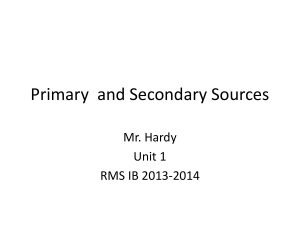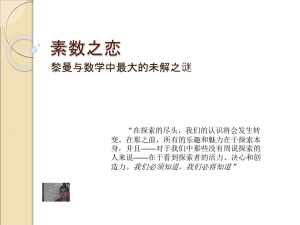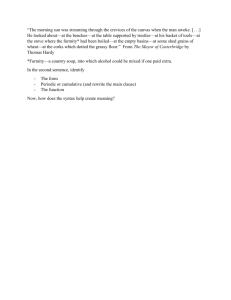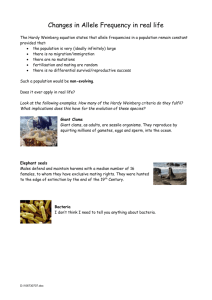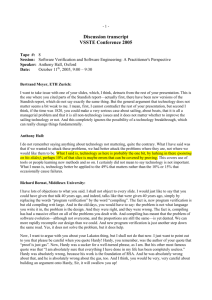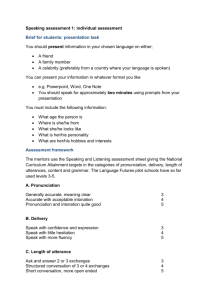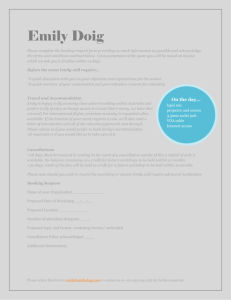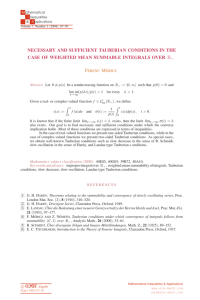A Phonetic Approach to Hardy`s "To Please His Wife"
advertisement
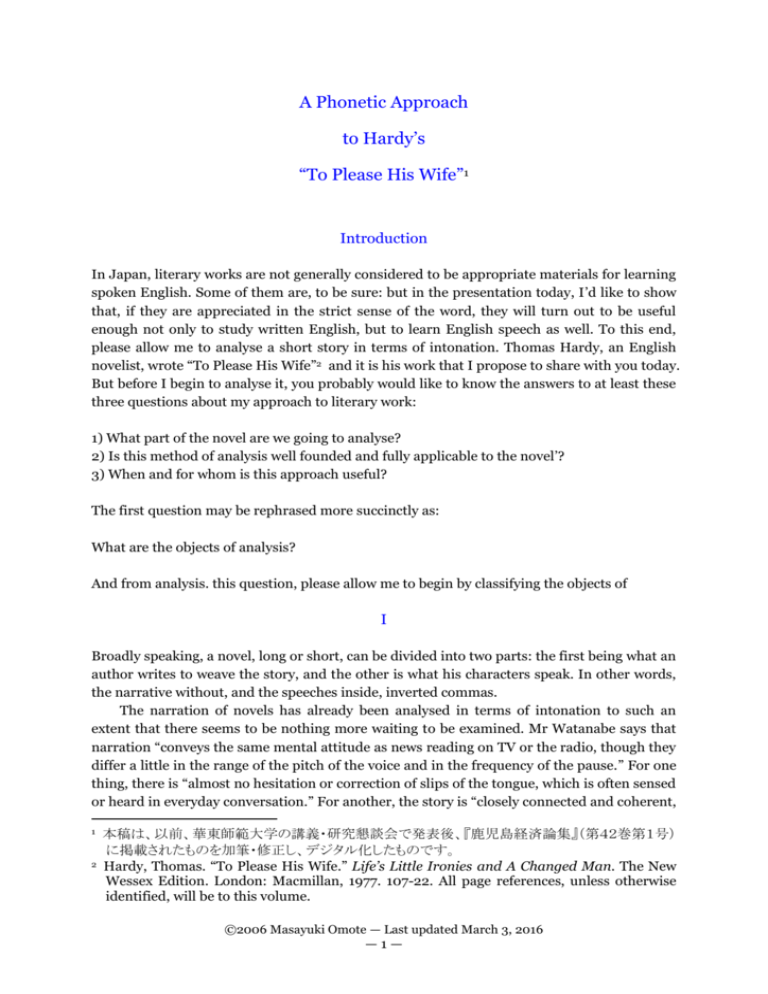
A Phonetic Approach to Hardy’s “To Please His Wife”1 Introduction In Japan, literary works are not generally considered to be appropriate materials for learning spoken English. Some of them are, to be sure: but in the presentation today, I’d like to show that, if they are appreciated in the strict sense of the word, they will turn out to be useful enough not only to study written English, but to learn English speech as well. To this end, please allow me to analyse a short story in terms of intonation. Thomas Hardy, an English novelist, wrote “To Please His Wife”2 and it is his work that I propose to share with you today. But before I begin to analyse it, you probably would like to know the answers to at least these three questions about my approach to literary work: 1) What part of the novel are we going to analyse? 2) Is this method of analysis well founded and fully applicable to the novel’? 3) When and for whom is this approach useful? The first question may be rephrased more succinctly as: What are the objects of analysis? And from analysis. this question, please allow me to begin by classifying the objects of I Broadly speaking, a novel, long or short, can be divided into two parts: the first being what an author writes to weave the story, and the other is what his characters speak. In other words, the narrative without, and the speeches inside, inverted commas. The narration of novels has already been analysed in terms of intonation to such an extent that there seems to be nothing more waiting to be examined. Mr Watanabe says that narration “conveys the same mental attitude as news reading on TV or the radio, though they differ a little in the range of the pitch of the voice and in the frequency of the pause.” For one thing, there is “almost no hesitation or correction of slips of the tongue, which is often sensed or heard in everyday conversation.” For another, the story is “closely connected and coherent, 1 2 本稿は、以前、華東師範大学の講義・研究懇談会で発表後、『鹿児島経済論集』(第42巻第1号) に掲載されたものを加筆・修正し、デジタル化したものです。 Hardy, Thomas. “To Please His Wife.” Life’s Little Ironies and A Changed Man. The New Wessex Edition. London: Macmillan, 1977. 107-22. All page references, unless otherwise identified, will be to this volume. ©2006 Masayuki Omote — Last updated March 3, 2016 —1— A Phonetic Approach to Hardy’s “To Please His Wife” so that it can be followed quite easily.”1 Besides, this all seems quite natural. After all, the greater part of the authors of 19th c. fiction are omniscient and so they wouldn’t have to hesitate, and would never make a mistake. So the intonation of narration has no choice but to be declarative, such as “Heaven was merciful, but it was not yet pleased to relieve her [Joanna’s] soul.” (120) On the other hand, according to Mr Watanabe, speeches in inverted commas have not been sufficiently analysed in terms of intonation as yet. He compares speeches in everyday conversation with ones in the movies and the dramas briefly: from one point of view, saying that they differ in enunciation,” naturally. But from another point of view, they belong to the spoken language, and so they share intonation.2 Speeches in the story are thought to be a mirror of utterances in our everyday talk. We can say safely that the former reflects the latter regarding intonation. In today’s presentation the objects of analysis will be the words uttered by characters in “To Please His Wife”. II The second question that I asked a little while ago was: Is this method of analysis well founded and fully applicable to the novel? This question may be rephrased more briefly as: Is this analytic method valid? We will establish the validity of this analytic method if we consider the relationship between Hardy and his characters’ speech and us readers. Williams, a literary critic, has pointed out that Hardy wrote his novels “to a mainly metropolitan and unconnected literary public.”3 “Unconnected” in his context means “having nothing to do with a rural life.” Now then, our chief concern is, How did the reading public feel towards Hardy’s characters speech? A review included mention of the rustics’ speech in The Return of the Native (1878) at its first appearance, and it criticized the unnaturalness of their rural speech disparagingly. People talk as no people ever talked before, or perhaps we should rather say as no people ever talk now. The language of his [Hardy’s] peasants may be Elizabethan, but it can hardly be Victorian. Such phrases as “being a man of the mournfullest make, I was scared a little,” or “he always had his great indignation ready against anything underhand,” are surprising in the mouth of the modern rustic.4 I’m afraid this passage, however, is really misleading. As a result, we might be fooled to labour under the impression that Hardy didn’t know the dialect of people in Dorsetshire very well and he abused it in his writing. As a matter of fact, though, a portion of Hardy’s “The Dorsetshire Labourer” (1883), as cited below, will save us from this deception: 1 2 3 4 Watanabe, Kazuyuki. Eigo Intonation Ron. Japan: Kenkyusya, 1994. 245-9. All the quotations from this book are translated from Japanese into English by the present writer. Watanabe 241. Williams, Raymond. The Country and the City. London: The Hogarth Press, 1985. 200. Thomas Hardy: The Critical Heritage. Ed. R. G. Cox. London: Routledge, 1970. 46. ©2006 Masayuki Omote — Last updated March 3, 2016 —2— A Phonetic Approach to Hardy’s “To Please His Wife” He [the sojourner from the city] would find that the language, instead of being a vile corruption of cultivated speech, was a tongue with a grammatical inflection rarely disregarded by his entertainer, though his entertainer’s children would occasionally make a sad hash of their talk. Having attended the National School they would mix the printed tongue as taught therein with the unwritten, dying, Wessex English that they had learnt of their parents, the result of this transitional state of theirs being a composite language without rule or harmony.1 Needless to say, this passage shows us clearly that just because the peasants speeches sound unnatural doesn’t mean Hardy was ignorant of the dialect of folks in Dorsetshire. In spite of the criticism, it would strike us that he adopted the dialect just to contribute to the creation of his world. The following article entitled “Dialect in Novels [1]” (1878) commands attention, because reading it will endorse the impression. A somewhat vexed question is reopened in your criticism of my story, The Return of the Native, namely, the representation in writing of the speech of the peasantry when that writing is intended to show mainly the character of the speakers, and only to give a general idea of their linguistic peculiarities. An author may be said to fairly convey the spirit of intelligent peasant talk if he retains the idiom, compass, and characteristic expressions, although he may not encumber the page with obsolete pronunciations of the purely English words, and with mispronunciations of those derived from Latin and Greek. In the printing of standard speech hardly any phonetic principle at all is observed; and if a writer attempts to exhibit on paper the precise accents of a rustic speaker he disturbs the proper balance of a true representation by unduly insisting upon the grotesque element; thus directing attention to a point of inferior interest, and diverting it from the speaker’s meaning, which is by far the chief concern where the aim is to depict the men and their natures rather than their dialect forms.2 With this article in mind, we see that Hardy was not simply familiar with the Dorsetshire dialect. Also, he intentionally utilized it as an effective tool for describing social classes in the Victorian age. For instance, in “To Please His Wife,” the author revised a speech of Shadrach’s so that it would better match with his trade. Our hero’s words “Who may those two maids be?” were converted to “Who may them two maids be?”3 (emphases added). In literary terms, Hardy registers the dialect on a list of describing tools like “love, sex, money, 1 2 3 Hardy, Thomas. “The Dorsetshire Labourer.” Longman’s magazine (1883). Rpt. in Thomas Hardy’s Personal Writings: Prefaces · Literary Opinions · Reminiscences. Ed. Harold Orel. London: Macmillan. 1990. 170. Hardy, Thomas. “Dialect in Novels [1].” Athenaeum (1878). Rpt. in Thomas Hardy’s Personal Writings: Prefaces · Literary Opinions · Reminiscences. Ed. Harold Orel. London: Macmillan. 1990. 91. Ray, Martin. Thomas Hardy: A Textual Study of the Short Stories. Hants: Ashgate Publishing Limited, 1997. 219. ©2006 Masayuki Omote — Last updated March 3, 2016 —3— A Phonetic Approach to Hardy’s “To Please His Wife” religion, the self and its possibilities.”1 This means that the dialect in his world is no longer a linguistic interest, but merely an object of interpretation to the eye of his readers. Partly because Hardy wrote his novels “to a mainly metropolitan and unconnected literary public,” partly because he created his own version of the Dorsetshire dialect, and partly because he himself declared that “in the printing of standard speech hardly any phonetic principle at all is observed,” doesn’t it follow that his characters’ speeches may well be interpreted just on principles of what is called Received Pronunciation? In my opinion, his works would seem to have ample room for analysis in terms of RP’s intonation. III The last question you need to know about my use of literary works for learning spoken English is: When and for whom is this approach useful? “To Please His Wife” can be analysed in terms of intonation, and this way of reading will enable you to notice and catch various connotations and delicate shades of meaning in characters’ speeches. Consider the following scene. After a few years’ voyage at sea, Shadrach Jolliffe returns to his native town, Havenpool, and involuntarily two-times Emily and Joanna. Though he is rumoured to marry the latter woman, he comes to Emily’s stationery shop just to urge her to love him again. She, however, wants to run away just at sight of him. At that moment he exclaims: “Don’t run away, Emily; don’t!” (110) If we analyse these words in terms of intonation, at least five interpretations present themselves. Please allow me to present Shadrach’s words in graphical forms in order to examine the five interpretations one by one. First of all, the movement of the pitch of the voice in the following diagram is what O’Connor and Arnold call “the Low Drop.”2 Let me explain how to interpret the following diagram. The top line shows the highest voice when a person talks; the bottom line shows the lowest. The dots show the approximate height of the voice on each syllable. The larger dots show stressed syllables and the smaller unstressed. The downward arrow shows that the voice glides down to a lower pitch. 1 2 Brown, Julia Prewitt. A Reader’s Guide to the Nineteenth-Century English Novel. New York: Macmillan, 1985. 25. O’Connor, J. D. & Arnold, G. F. Intonation of Colloquial English: A practical handbook. 2nd ed. London: Longman, 1973. 52. ©2006 Masayuki Omote — Last updated March 3, 2016 —4— A Phonetic Approach to Hardy’s “To Please His Wife” When you utter in the order of “the Low Drop” sequence, it has a “very serious and “very strong” imperative force of a command. Secondly, when the speaker utters the words in the following “High Drop” sequence, it sounds like the speaker “suggests a course of action” and doesn’t care whether the other person follows the suggestion or not1: Thirdly, when you utter in the order of “the Take-Off,” you “appeal”2 to the listener to change his mind. The upward arrow shows the voice glides up to a higher pitch. Fourthly, when the voice first rises and then falls, the rise and fall combine to give birth to “the Long Jump.” The Long Jump suggests a course of action as well as the High Drop. It expresses critical “surprise” at the listener not having the slightest idea of the palpable course of action.3 1 2 3 O’Connor & Arnold 56. O’Connor & Arnold 61-2. O’Connor & Arnold 74. ©2006 Masayuki Omote — Last updated March 3, 2016 —5— A Phonetic Approach to Hardy’s “To Please His Wife” Finally, when the voice moves in the opposite direction of the above-mentioned “Long Jump” intonation, the words with the fall-rise tone termed “the High Dive” sound “pleading” or “persuading”1: Therefore, I have shown that the imperative “Don’t run away” is open to at least five different interpretations. This awareness of choice adds up positively for the “appreciative” reader. Any one of these alternatives adds to the finishing touch of one’s appreciation. Just imagine how useful and helpful it can be for students whose mother tongue is not English, especially when they have to articulate their emotions with real feeling. In this sense, from now on, appreciation and usefulness can be combined by this analytic method, with a particular emphasis on intonation. IV I’ve showed the ups and downs of voice patterns with the graphic forms. To save space from now on, I will show it by putting the following symbols and arrow just on the left side of the stressed syllable; the manner in which O’Connor and Arnold do in their book. The above-mentioned sentences would be written as follows: The Low Drop is “╵Don’t ╵run a way.” ∖ The High Drop is “╵Don’t °run a∖way.” The Take-Off is “╷Don’t 。run a/way.” The Long Jump is “Don’t °run a∖way.” The High Dive is “∖Don’t 。run a/way.” Concerning recorded materials, I have used the tape recorded by Gilbert Hitchens.2 On analysis of intonation in “To Please His Wife,” allow me to catch up on various connotations and delicate shades of meaning in as many imperative sentences in the work as possible. First, there are quite a few regular commands that are read aloud in the Low Drop. For 1 2 O’Connor & Arnold 87. Hitchens, Gilbert. To Please His Wife and Other Stories. Japan: Seibido, n. d. ©2006 Masayuki Omote — Last updated March 3, 2016 —6— A Phonetic Approach to Hardy’s “To Please His Wife” example, when Shadrach presses, the bothered Emily enjoins: “╵Don’t ╵say any more, Mr Jolliffe, don’t!” said she, choking. (110) ∖ ∖ Later on, though persuaded by him she says: “╵Don’t stay ╵any longer, Captain Jolliffe!” (111) ∖ Emily’s words are far from a request or suggestion, though the combination of the negative imperative with the fall helps to strengthen the imperative force of the command. Also, we can find a few more examples: when Shadrach proposes to his wife Joanna that he should go coast-trading along with their sons in order to make more money, Joanna says “╵Don’t say ∖ 。that, Shadrach” (117). Yet the next day, the greedy Joanna said, “╵Tell me more a。bout ∖ 。this” (117).1 Needless to say, these words of hers have the imperative force of a regular command. Before they get married, Joanna knows Shadrach and Emily have been lovers, and when he talks to her, Joanna warns: “Go a∖long ... or Emily will be jealous!” (109) Of course, in such a directive as this, “go along” should be read aloud with a mild rise; “Emily will ...” with a fall.2 But by saying “go along” in the Long Jump, Joanna doesn’t give him an order, but she tries to let him know what he is doing, since she knows he and Emily are courting. Not surprisingly, Joanna is both surprised at and reproving him for his obtuseness. Related to the Long Jump, another imperative sentence commands attention, because its component necessitates the Long Jump. That is heard when Shadrach comes to Emily’s stationery shop just to urge her to love him again. When she says, “I don’t hate you. How can I?” he responds: “Then come ∖out, so that we can talk like Christians.” (110) The directive with “then” which means “in that case,” has to be said in the Long Jump.3 Of course, this directive has its own connotations conveyed by the intonation, but I’m going to mention them a little later for want of time. 1 2 3 Watanabe 188. As far as the last directive is concerned, it is noteworthy that “affirmative imperatives with a fall will be a neutral way of commanding; on the other hand, those with a mild rise tone down the imperative force of a command.” Yasui, Izumi. Onseigaku [Phonetics]. Japan: Kaitakusha, 1992. 322. Yasui 321. ©2006 Masayuki Omote — Last updated March 3, 2016 —7— A Phonetic Approach to Hardy’s “To Please His Wife” Now I would like to give you an example of the High Dive, so that we can easily see how intonation must tally with meaning. After Shadrach and Joanna get married, she reproaches him for his being irresponsible for their poverty and easy-going. But he makes a joke out of their old times, saying that she has done Emily a good turn by winning him away from her. Instead of getting angry with this, Joanna says to him: “∖Don’t 。speak of bygones!” she implored, in stern sadness. “But think, for the / boys’ and my sake, if not for your own, what are we to do to get richer?” (115) With the way she expresses her feelings, we can easily see that the High Dive makes “don’t speak of bygones!” and “implored” hang together in meaning and intonation. If it had not been for a thought over intonation, we would have run the risk of reading the passage and being undermined fatally. Such analysis of speech in terms of intonation as I have explained above can well apply to other kinds of utterances than commands: declarative and interrogative ones and exclamations. Let’s end up by extending our method of interpreting to a part of the scene, in which Shadrach comes to Emily’s stationery shop just to urge her to love him again. “I just called as I was passing,” he [Shadrach] said. “For some ˇpaper?” She [Emily] hastened behind the counter. “No, no, ∖Emily; why do you °get be∖hind 。there? Why °not °stay by me? ¯You ╷seem to hate me.” “I ╷don’t °hate you. How can I?” “Then come out, so that we can talk like Christians.” Emily obeyed with a fitful laugh, till she stood again beside him in the open part of the shop. (110) Such a statement as “No, no, Emily” combines with the Long Jump to sound like a “protest” as though the speaker is suffering for unfairness.1 You probably want to know, in Shadrach’s case, what he is protesting about, and what kind of unfairness he is suffering for. To learn the answer, we must pay attention to Emily’s words. She asks “For some paper?” This question, in fact, carries a peculiar fall-rise, which “leads”2 a person to say just “yes.” As a result, there is no chance of receiving the answer “no.” To Shadrach, this sounds anything but fair. Accordingly, he protests against her unfair question by saying “No, no, Emily” in the Long Jump. What is on his mind now is also conveyed in much the same way by “Why not stay by me?” As far as “you seem to hate me” is concerned, the sentence is apt to have double meanings. Interpretation depends upon the verb “seem” being emphasized. Compare the following pair. 1 2 O’Connor & Arnold Yasui 308. 73. ©2006 Masayuki Omote — Last updated March 3, 2016 —8— A Phonetic Approach to Hardy’s “To Please His Wife” He 。seems ╵very ∖nice. = He is very nice. He ╵seems ╵very ∖nice. = He is not very nice.1 By saying “you seem to hate me,” Shadrach really means “as if you hated me.” On hearing this, Emily returned, “I don’t hate you.” With an emphasis on “you,” what she means can be understood as “I hate Joanna, not you.” In short, her speeches imply that her love is still alive. In this case, the rhetorical question, conveying her confusion, means “How can I hate you, whom I still love?” rather than “How can I hate you, who are nothing to me now?” At this point Shadrach is reassured of her continuing love; and that is the reason why he says, “Then come out.” At these words, Emily perceives he is surprised at and reproving her for her disobeying her inner voice. The perception wins her round, and she comes out from behind the counter. Her fitful laugh signifies loud and clear the evanescent revival of love after estrangement. Conclusion In conclusion, I would like to assure you that, if we want to teach spoken English, a literary work can serve the purpose rather satisfactorily. But in Japan, where it is deemed as an out-of-date teaching material, little is thought of it now. I suppose that certain textbooks, such as comprehensive English-teaching materials, textbooks for TOEFL, etc. are practical, business-like and profitable. Even if I don’t disapprove of all, I am sorry to say most of them don’t seem to draw students’ deep interest to English. In a “Low Drop” utterance, please allow me to finish by saying now is the time to reconsider what materials and resources we should invest our energy in. 1 O’Connor, J. D. Better English Pronunciation —New Edition—. Japan: Seibido, 1982. 110. ©2006 Masayuki Omote — Last updated March 3, 2016 —9—
